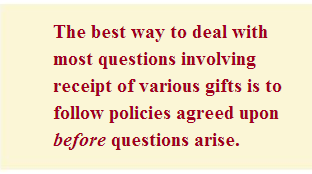“What do we do if a donor wants to give us the family silver?”
“What fees can we legitimately pay in connection with the receipt of a particular gift?”
“Should we give credit for a gift of life insurance to our campaign?”
We are often asked these and similar questions in the course of helping our clients build successful gift planning programs. While some answers are straightforward, most require careful consideration of a number of interrelated and sometimes competing considerations.
Are you ready?
Consider this scenario:
You receive a phone call from someone who identifies himself as an advisor to a person who is interested in making a gift of real estate.
You learn that the advisor, his client and the property in question are all some 2,000 miles away.
The proposed gift would involve a transfer of the real estate to a charitable remainder trust. According to the caller, the property has been appraised at over $2 million by a reputable appraiser.
The donor, whose age is not revealed, would like to receive a fixed income of 6 percent for life. The advisor would like to know within a few days:
- Would you like to be considered for the gift?
- Can you serve as trustee? If not, will you pay the trustee fees for a professional fiduciary?
- Will you pay the legal and other costs associated with completing the gift?
- Since there is a “small mortgage” on the property, would you be willing to buy a portion of the property sufficient to allow the donor to pay off the mortgage before making the transfer?
The advisor makes it clear that you may not speak directly with his client and that there are several other charities “in the running” for this gift.
Are you prepared to answer? Could you respond if it were the donor calling with an offer to make an immediate outright gift of the property?
Think ahead
The best way to deal with most questions involving receipt of various gifts is to follow policies agreed upon before questions arise. When such decisions are made in the “heat of battle,” organizational politics of the moment and other considerations can sometimes play too great a role in reaching a decision. A poor decision in one case under one set of circumstances may then set an inappropriate precedent for future fundraising activities.
We recommend that all organizations and institutions involved in fund development have policies in

place to guide staff and volunteers as they decide what gifts to accept, how to credit and value them, and in what ways they may be restricted.
Those contemplating an emphasis on endowment development would be especially well served in adopting well-considered gift acceptance policies prior to embarking on their efforts.
Even those who limit their activities to outright current gifts of cash and checks will face situations where donors wish to attach various “strings” to gifts and restrict them in unacceptable ways. Clearly stated gift acceptance policies will help prevent awkward situations that could result in confusion and ill will among potential donors.
As you begin the process of establishing guidelines, you can expect to ride a rocky road. Discussion of the various issues involved is bound to bring to the surface differences of opinion among staff and volunteer leaders. But persevere! The reward will be policies that will help you answer donors’ questions promptly and lead to a solid financial future for your organization.
In future issues we will address such topics as accepting gifts of real estate and other non-cash assets, crediting and valuing gifts for credit in campaigns, restricting gift purposes, delegating authority to volunteers, and other questions commonly faced by authors of gift acceptance policies.

